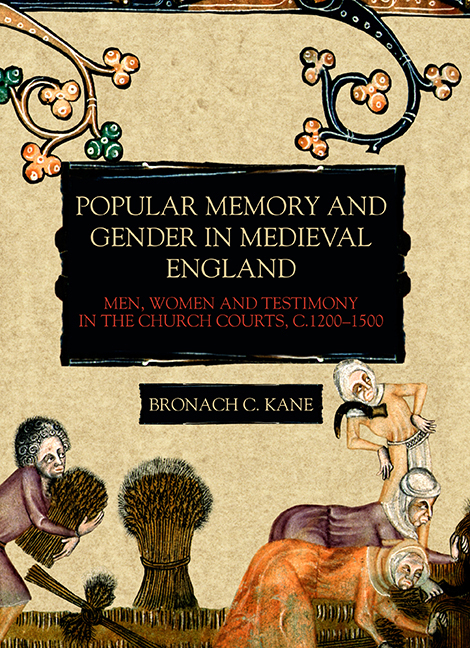 Popular Memory and Gender in Medieval England
Popular Memory and Gender in Medieval England Book contents
- Frontmatter
- Dedication
- CONTENTS
- List of Abbreviations
- Introduction
- Chapter 1 Pastoral Care, Canon Law, and Social Relations
- Chapter 2 Gender, Narrative, and Testimony
- Chapter 3 Bodily Practices
- Chapter 4 Sexuality and Generation
- Chapter 5 Marriage, Kinship, and Widowhood
- Chapter 6 Orality, Written Memory, and Custom
- Chapter 7 Place, Landscape, and Gender
- Conclusion
- Bibliography
- Acknowledgements
- Index
- Gender in the Middle Ages
Chapter 3 - Bodily Practices
Published online by Cambridge University Press: 03 September 2019
- Frontmatter
- Dedication
- CONTENTS
- List of Abbreviations
- Introduction
- Chapter 1 Pastoral Care, Canon Law, and Social Relations
- Chapter 2 Gender, Narrative, and Testimony
- Chapter 3 Bodily Practices
- Chapter 4 Sexuality and Generation
- Chapter 5 Marriage, Kinship, and Widowhood
- Chapter 6 Orality, Written Memory, and Custom
- Chapter 7 Place, Landscape, and Gender
- Conclusion
- Bibliography
- Acknowledgements
- Index
- Gender in the Middle Ages
Summary
Men and women framed the past using narratives and symbols centred on physical experiences and practices accumulated over long periods. Existing works on memory and the body in medieval culture, however, focus more on their interrelation in learned rather than non-elite contexts. For instance, the intellectual tradition of the ars memoria emphasised synaesthesia and embodiment in the formation of memory. The human heart was itself interpreted as the storehouse for memory in ancient and medieval thought, and was often used as a metaphor for remembrance in literary and religious texts. A number of studies on mystical texts similarly note how the body became a site of contemplation and mortification as men and women channelled affective responses to Christ and his suffering. By the mid-fourteenth century, the Passion was itself enshrined in devotional lyrics in the form of the literary Charters of Christ, in which legalistic language and structures were applied to the metaphor of Christ's crucified body. Likewise, pain was inflicted upon young bodies in both pedagogic and everyday settings, especially in cases concerning proof of land ownership, demonstrating a belief that physical chastisement could help imprint memories of past events.
Such work highlights the embodied nature of remembrance, particularly in religious settings, yet the relationship between memory and the body in lay contexts remains underexplored. A constellation of practices underpinned the formation of memory in everyday life as embodied pasts were recalled in accounts that centred on the body and its affective states. This included fields of behaviour where the role of gender seems more overt, like sexual activity and childbirth, as well as areas such as work and physical violence, where gender initially appears less central but on closer analysis exerted a constitutive force. Popular memories thus developed in bodies that bore meaning in the present, by accommodating individual and collective notions from the past. This chapter explores the use and formulation of physical forms of memory in everyday contexts, while sexual and reproductive histories are addressed separately in Chapter 4.
Memories associated with the body and its practices represented attempts to stabilise physical behaviour into coherent testimony.
- Type
- Chapter
- Information
- Popular Memory and Gender in Medieval EnglandMen, Women, and Testimony in the Church Courts, c.1200–1500, pp. 81 - 108Publisher: Boydell & BrewerPrint publication year: 2019


